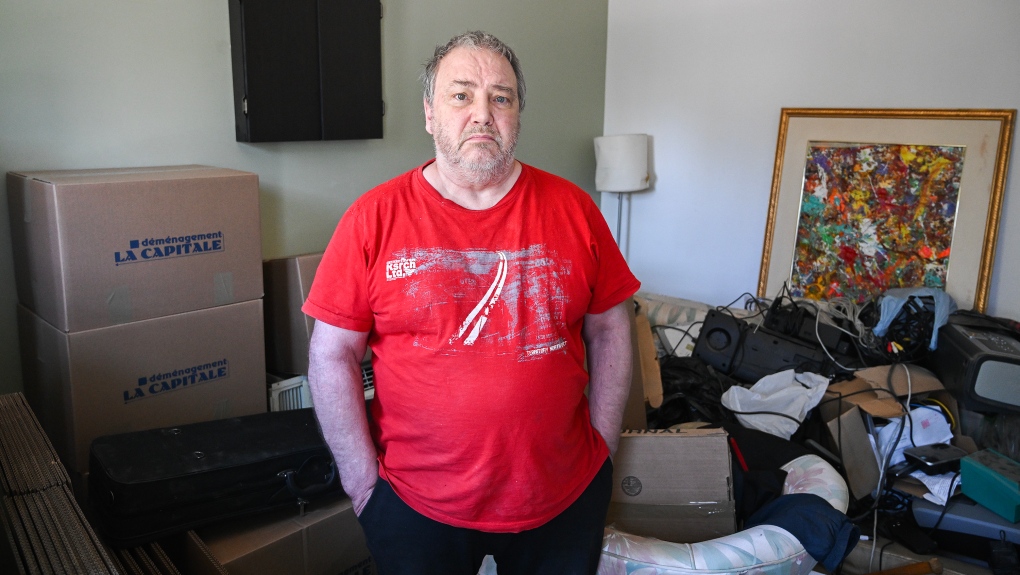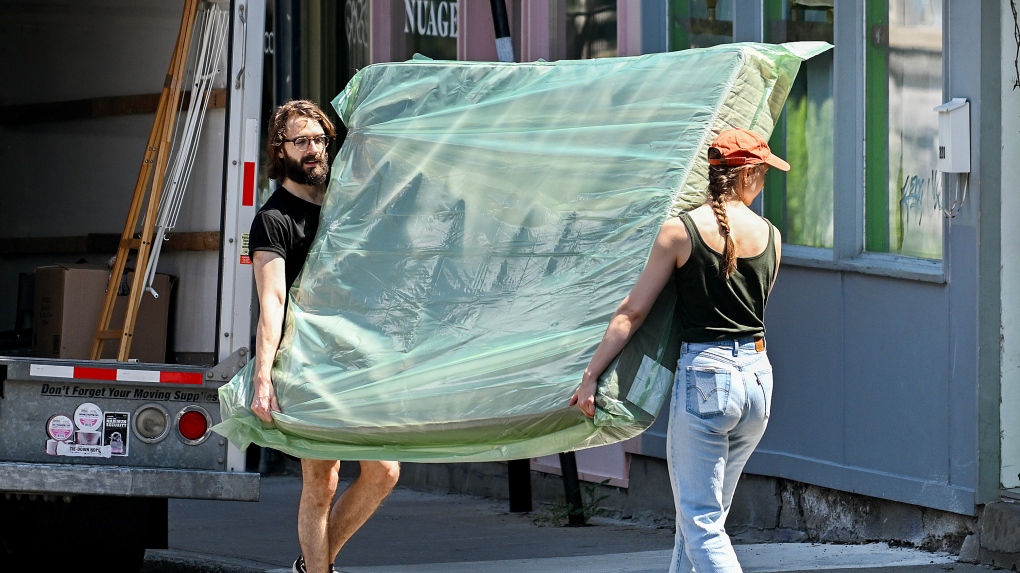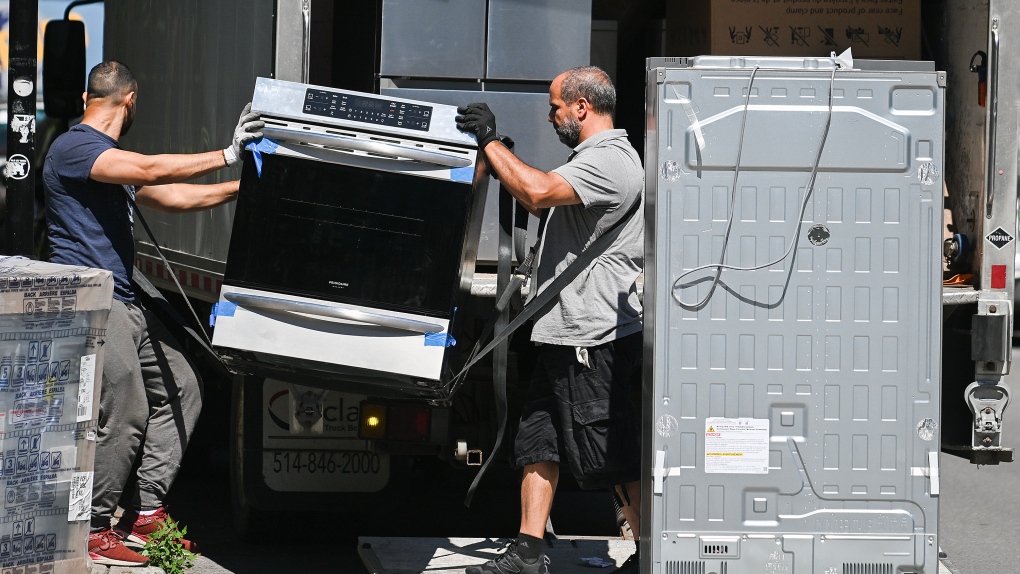Nearly 1,300 Quebec families still looking for a home on Moving Day
It's moving day in Quebec, and Mario Lortie is leaving his apartment of 27 years.
It's not by choice. His new landlords, who recently bought the Montreal duplex where he lives, want to convert the building into a single home, so Lortie got the boot.
The problem is he has nowhere to go. The 62-year-old former social worker lives on welfare due to health problems, and was paying just $535 a month in rent. After a fruitless search for another apartment he could afford, Lortie turned to a community organization that helped him get a temporary spot in a downtown hotel, paid for by Montreal's municipal housing office.
So Lortie packed his things into storage and got ready to leave. He can stay at the hotel for two months, but isn't sure what comes next.
"I'm going to have to keep looking for housing," he said. "But it stresses me out a lot, because two months seems completely insufficient."
 Mario Lortie poses in his apartment in Montreal, Friday, June 28, 2024. THE CANADIAN PRESS/Graham Hughes
Mario Lortie poses in his apartment in Montreal, Friday, June 28, 2024. THE CANADIAN PRESS/Graham Hughes
Montreal has long been known as a haven for artists, musicians and writers – a cosmopolitan city where it was possible to earn little and still live well. But rents have spiked and housing availability has dropped in recent years. Housing advocates say it's changing the face of the city, while property owners say rising prices are part of a necessary correction in an area where rents have stayed too low for too long.
But this July 1, the day when most Quebec leases expire, Lortie is just trying to put one foot in front of the other. He suffers from depression, and he's been having a hard time sleeping through the night. He said he struggled to get all his belongings packed up in time.
"I couldn't focus on it," he said. "I was completely discouraged."
Lortie's story is not unique. As of Monday morning, there were nearly 1,300 Quebec households seeking help from government services to find housing, including 159 in Montreal. The number of requests for help finding housing has almost doubled in a year.
"Maybe people elsewhere in Canada think Quebec is more affordable," said Véronique Laflamme, spokesperson for the Montreal-based housing advocacy group FRAPRU. "Quebec was maybe less affected by unaffordability until recently, but that's no longer the case."
 People remove a mattress from the back of a truck on moving day in Montreal, Monday, July 1, 2024. THE CANADIAN PRESS/Graham Hughes
People remove a mattress from the back of a truck on moving day in Montreal, Monday, July 1, 2024. THE CANADIAN PRESS/Graham Hughes
In January, the Canada Mortgage and Housing Corporation reported the average rent for a two-bedroom apartment in Montreal had increased by a record 7.9 per cent in 2023. The hike far outstripped the average wage increase of 4.5 per cent.
At the same time, the rental vacancy rate had declined to 1.5 per cent from two per cent a year earlier – a trend seen in many Canadian cities.
Housing advocates are sounding the alarm. According to the Quebec housing and tenants' rights group RCLALQ, the average rent for available units in Montreal has increased 27 per cent in the last four years. Other cities in the province have seen steeper hikes.
"The city that I grew up in … is not the same city that I see today," said Cédric Dussault, a spokesperson for the group. "We've seen a gentrification of neighbourhoods that has transformed completely the face of the city."
Some experts say Quebec is loosening the rules that for years helped keep prices low. "Part of the reason why Montreal was historically more affordable wasn't by accident. It was in part because of really strong tenant organizations, protections for tenants and housing rights being enacted," said Jayne Malenfant, a professor of social justice who studies housing policy at McGill University.
But that's now changing, Malenfant said. In particular, they pointed to a recent law that gives landlords the right to refuse lease transfers. The bill, passed in February, sparked protests by those who argued that transferring a lease from one tenant to another prevented landlords from hiking rent between tenants.
Following the outcry, the Quebec government passed a second law last month that puts a three-year moratorium on certain types of evictions.
Meanwhile, landlords say they're also facing cost increases, and they argue rents in Quebec need to keep pace. "The rent increases remain too low to be profitable," said Martin Messier, president of a Quebec association representing landlords.
"If we want to see investors interested, we need to make sure that the profitability is respectable."
Messier said the rent increases on available units don't tell the whole story, noting there are many cheaper rental units that tenants rarely vacate.
In fact, despite the upward trend, Montreal remains considerably more affordable than the other biggest cities in Canada. According to the CMHC, the average rent in 2023 for a two-bedroom apartment in Montreal was $1,096, compared to $1,961 in Toronto and $2,181 in Vancouver.
Quebec Premier François Legault has promised to build more housing. Last fall, the provincial and federal governments each promised to spend $900 million over the next four years to speed up construction in the province.
Lately, however, Legault has repeatedly claimed that temporary immigrants are responsible for the province's housing crisis. Housing advocates say the premier is using immigrants as a scapegoat, though the CMHC report does say that non-permanent residents have contributed to the rental pressure in Montreal.
 People carry appliances from a truck on moving day in Montreal, Monday, July 1, 2024. THE CANADIAN PRESS/Graham Hughes
People carry appliances from a truck on moving day in Montreal, Monday, July 1, 2024. THE CANADIAN PRESS/Graham Hughes
Dussault believes the solution is to build more social housing and pass stricter rent controls.
"In Quebec, on paper, we have better protection than in other provinces, but this is just on paper," he said.
Lortie is currently waiting for a social housing unit, but with around 35,000 households on the waitlist, there's no guarantee he'll get one anytime soon. Until then, he'll keep looking for something that's increasingly difficult to find.
"(Montreal) doesn't have the reputation that it once had," Dussault said. "We've spoken about how this city has become less and less affordable. We have said this for years. But now it's not even a question of being less affordable. It's a question of having the possibility to live in this city, period."
This report by The Canadian Press was first published July 1, 2024.
CTVNews.ca Top Stories

Can the Governor General do what Pierre Poilievre is asking? This expert says no
A historically difficult week for Prime Minister Justin Trudeau and his Liberal government ended with a renewed push from Conservative Leader Pierre Poilievre to topple this government – this time in the form a letter to the Governor General.
'I'm still thinking pinch me': lost puppy reunited with family after five years
After almost five years of searching and never giving up hope, the Tuffin family received the best Christmas gift they could have hoped for: being reunited with their long-lost puppy.
Wrongfully convicted N.B. man has mixed feelings since exoneration
Robert Mailman, 76, was exonerated on Jan. 4 of a 1983 murder for which he and his friend Walter Gillespie served lengthy prison terms.
Pickup truck driver killed by police after driving through Texas mall and injuring 5
A pickup truck driver fleeing police careened through the doors of a JCPenney store in Texas and continued through a busy mall, injuring five people before he was fatally shot by officers, authorities said.
Unifor members ratify new agreement with Canadian National Railway
Unifor said on Sunday that its members at Canadian National Railway (CN Rail) have ratified a new four-year collective agreement, averting a potential strike action.
6 adults, 4 children taken to hospital following suspected carbon monoxide exposure in Vanier
The Ottawa Paramedic Service says ten people were taken to hospital, one of them in life-threatening condition, following an incident of suspected carbon monoxide exposure Sunday morning in the neighbourhood of Vanier.
Two U.S. Navy pilots shot down over Red Sea in apparent 'friendly fire' incident, U.S. military says
Two U.S. Navy pilots were shot down Sunday over the Red Sea in an apparent 'friendly fire' incident, the U.S military said, marking the most serious incident to threaten troops in over a year of America targeting Yemen's Houthi rebels.
Big splash: Halifax mermaid waves goodbye after 16 years
Halifax's Raina the Mermaid is closing her business after 16 years in the Maritimes.
Second body recovered from site of B.C. landslide
The second resident of a home that was destroyed by a landslide in Lions Bay, B.C., last weekend was found dead Saturday, officials confirmed.
































